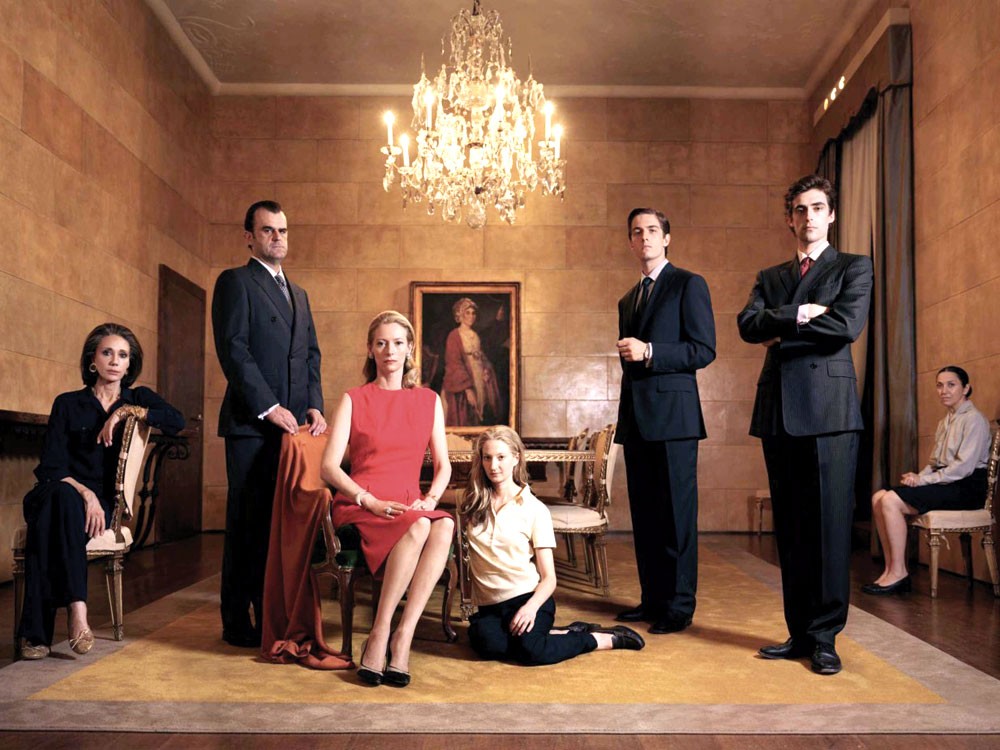I Am Love feels like a period drama. It’s intended that way, I think. The period, though, isn’t exactly clear. The costumes feel like 20th-century Mediterranean chic, the kind that you’d see as often in The Talented Mr. Ripley as a mid-‘80s Ralph Lauren ad. The cinematography by Yorick Le Saux often feels like a gauzy, dandelion-hued ode to ‘60s American independent film. The automobiles appear to be contemporary.
And so the viewer spends a good deal of time wondering where the hell we are. They’re speaking Italian. That’s a clue at least.
By the third act, things are clearer. Props tell us it’s post-1994 and the blithe ruminations of the idea that capital can turn even war into an opportunity for third-world development put it clearly pre-September 11.
We’ve seen a textile mill, the source of the Recchi family’s extravagant wealth, which means we began the film in Milan, in the Recchi’s mid-century palazzo. (It’s ultimately a strength of the film, not a weakness, that we are continually looking back at the beginning as facts about place and time are revealed.)
The patriarch of the family, after saying the mill is his ticket to posterity and that it should be run well after his death, bequeaths control to his son, Tancredo, and Tancredo’s son Edoardo.
This creates business drama — Tancredo wants out from under his father’s legacy and Edo, always favored by granddad, wants to follow in the old man’s footsteps. But the Recchi fortune is really just an elaborate backdrop to a study on sexual politics, longing and self-determination in a time when personal freedoms — especially for the super-rich — have never been greater.
It turns out the daughter is a lesbian pursuing a career as a photographer rather than a painter, much to the displeasure of the elder Recchi. Edo is mindful of his family’s legacy, but more enamored of financing art. He spends the film trying to help his pauper friend Antonio open a restaurant in San Remo. It seems possible throughout that Edo and Antonio might also be lovers. Emma, the mother (Tilda Swinton), is Russian by birth but thoroughly Italian at this point. She seems content to run the house the way wealthy wives are expected to, until she’s not.
The Recchis are neither heroes nor monsters. They’re heirs to a lifestyle that hovers off the ground. The only thing they’re tethered to — the expectations placed on them by the family textile business — mean different things to each of them.
The cinematography, which is obsessed with points of focus and the environments the Recchi family finds themselves in, sometimes feels beautifully evocative of the mood of the characters and sometimes irritatingly obtuse and impressionistic. There are no grand soliloquies offering insight into these characters. They remain black boxes on the seafloor of their own ambition and disappointment.
Which is nice, in a sense, and unendingly frustrating in others.
I Am Love eventually settles down around Emma, and is ultimately most satisfying as a her tale following her as she, in turn, follows in the footsteps of her children. Or more precisely, as she chooses to run off down the path of youth in mid-life.
That this path quickly leads to familial tragedy can be read any of a number of ways.
We are meant to feel pity for Emma’s plight, though it’s clear she wasn’t sold into marriage. She went willingly — though perhaps impetuously — in her youth, before she had a chance to know what she wanted. Why she’s never been back to the Russia she so adores — despite fabulous wealth — is left to the audience to mull over.
It’s in that vagueness that Luca Guadagnino does his bravest bit of directing at the end: he lets the viewer finish his work in our minds. It’s not a particularly rewarding film by the time the credits roll, but it’s a difficult film that grows in importance in memory as you sculpt its murkiness into something that bears individual meaning.
Slowly too, all the background business about the family business percolates up and begins to add meaning you didn’t expect. I Am Love becomes proof that the world of a decade ago is a remote thing, and that change has never come so quickly. More than just the death of a family dynasty, I Am Love may turn out to be our first glimpse into the death of the idea of dynasty itself.





















